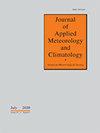网格间距和台网对北京冬奥复杂地形地表分析预报的影响
IF 2.2
3区 地球科学
Q3 METEOROLOGY & ATMOSPHERIC SCIENCES
引用次数: 0
摘要
摘要研究了网格间距和台网对北京冬奥复杂地形温度、湿度、风等地面分析预报的影响。高分辨率分析由快速刷新集成系统生成,该系统包括地形降尺程序。结果表明,目标网格间距越大,表面分析精度越高。特别是,当网格尺寸增大时,地表温度、湿度和风的平均分析误差都显著减小。这主要是由于综合系统中地形效应的模拟更加真实,因为高网格间距的地形降尺度可以增加复杂山区的更多细节。在1km ~ 100m范围内,1 ~ 12h的温度、湿度预报也有较大改善,而在1 ~ 6h范围内,风速预报仅略有改善。进一步探讨了台网对地面分析的影响。结果表明:增加密集的自动气象站网络,可以吸收更多的观测信息,使百米空间尺度的温湿度空间分布更加真实和准确。站网的增加也能减少预报误差,预报误差可持续6小时左右。然而,虽然随着台站的增加,地面风显示出更好的分析能力,但山顶地区的风有时对分析和预报的影响都略差。研究结果有助于改善复杂地形下的分析和预报产品,并对从粗网格尺寸降尺度到细网格尺寸具有一定的指导意义。本文章由计算机程序翻译,如有差异,请以英文原文为准。
The impacts of grid spacing and station network on surface analyses and forecasts in Beijing Winter Olympic complex terrain
Abstract This study investigates the impacts of grid spacing and station network on surface analyses and forecasts including temperature, humidity and winds in Beijing Winter Olympic complex terrain. The high-resolution analyses are generated by a rapid-refresh integrated system that includes a topographic downscaling procedure. Results show that surface analyses are more accurate with a higher targeted grid spacing. Particularly, the average analysis errors of surface temperature, humidity, and winds are all significantly reduced when the grid size is increased. This improvement is mainly attributed to a more realistic simulation of the topographic effects in the integrated system because the topographic downscaling at higher grid spacing can add more details in complex mountain region. From 1km to 100m, 1-12h forecasts of temperature and humidity are also largely improved, while the wind only show slight improvement for 1-6h forecasts. The influence of station network on the surface analyses is further examined. Results show that the spatial distributions of temperature and humidity at hundred-meter space scale are more realistic and accurate when adding an intensive automatic weather station network, as more observational information can be absorbed. The adding of station network can also reduce the forecast errors, which can last for about 6 hours. However, although surface winds display better analysis skill when adding more stations, the wind at the mountain top region sometimes encounter a marginally worse effect for both analysis and forecast. The results are helpful to improve the analysis and forecast products in complex terrain, and have some implications for downscaling from coarse grid size to a finer grid.
求助全文
通过发布文献求助,成功后即可免费获取论文全文。
去求助
来源期刊
CiteScore
5.10
自引率
6.70%
发文量
97
审稿时长
3 months
期刊介绍:
The Journal of Applied Meteorology and Climatology (JAMC) (ISSN: 1558-8424; eISSN: 1558-8432) publishes applied research on meteorology and climatology. Examples of meteorological research include topics such as weather modification, satellite meteorology, radar meteorology, boundary layer processes, physical meteorology, air pollution meteorology (including dispersion and chemical processes), agricultural and forest meteorology, mountain meteorology, and applied meteorological numerical models. Examples of climatological research include the use of climate information in impact assessments, dynamical and statistical downscaling, seasonal climate forecast applications and verification, climate risk and vulnerability, development of climate monitoring tools, and urban and local climates.

 求助内容:
求助内容: 应助结果提醒方式:
应助结果提醒方式:


